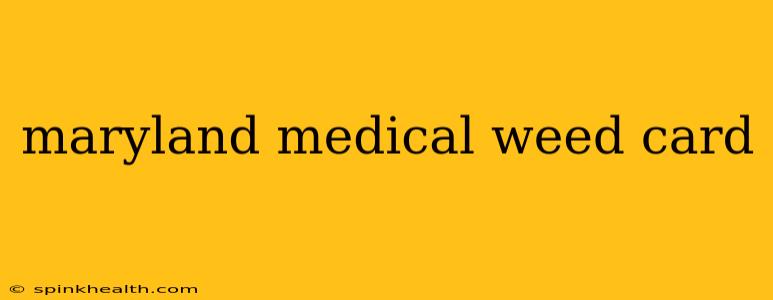The journey to obtaining a Maryland medical cannabis card can feel daunting, filled with unfamiliar regulations and processes. But fear not! This guide will walk you through the entire process, answering your burning questions and ensuring you're well-prepared every step of the way. Think of it as your personal roadmap to accessing medical cannabis in Maryland.
My own story began with debilitating migraines that traditional medicine couldn't alleviate. After years of struggling, a friend suggested exploring medical cannabis. The initial research felt overwhelming, but after navigating the system, I'm here to share my experience and help you avoid the pitfalls I encountered.
What are the qualifying conditions for a Maryland medical cannabis card?
Maryland's medical cannabis program doesn't have a rigid list of conditions. Instead, it utilizes a system where a physician must certify that a patient has a debilitating medical condition that could benefit from cannabis. This means the physician uses their professional judgment to determine if cannabis is a suitable treatment option for your specific situation. Common conditions that are often considered include:
- Chronic pain: This can stem from various sources, including arthritis, fibromyalgia, and nerve damage.
- Severe nausea: Often associated with cancer treatment or other debilitating illnesses.
- Seizures: Especially in cases where other treatments haven't been effective.
- Multiple sclerosis (MS): Managing the symptoms of MS, such as muscle spasms and pain.
- Glaucoma: While not directly cured by cannabis, it can help manage intraocular pressure.
- Anxiety disorders: In severe cases where other treatments haven't provided sufficient relief.
- Post-traumatic stress disorder (PTSD): Managing the symptoms of PTSD, such as flashbacks and anxiety.
Important Note: This is not an exhaustive list. Always consult with your physician to determine if you qualify.
How do I find a physician who certifies patients for medical cannabis?
Finding a qualified physician is a crucial step. Not all doctors participate in the Maryland medical cannabis program. The Maryland Medical Cannabis Commission's website doesn't provide a list of physicians, but you can easily find them through online searches or by asking your primary care physician for a referral. Many doctors specializing in pain management, neurology, or oncology are often familiar with the program. Look for physicians who openly advertise their participation in the program.
What is the process of getting certified?
Once you've found a participating physician, the process generally involves:
- Consultation: You'll have a consultation with the doctor to discuss your medical history and current condition. Be prepared to provide detailed information about your symptoms and treatments you've already tried.
- Medical evaluation: The doctor will conduct a thorough evaluation to determine if your condition qualifies under the Maryland program.
- Certification: If the physician determines you qualify, they'll provide you with a certification recommending medical cannabis. This certificate is submitted to the state.
- Application: You'll need to complete an application through the Maryland Medical Cannabis Commission's online portal.
How much does a medical cannabis card cost in Maryland?
The cost of the card itself is relatively low, but the cost of the physician's consultation can vary significantly depending on the provider. It's essential to inquire about the fees upfront to avoid unexpected expenses.
How long does it take to get a Maryland medical cannabis card?
The processing time for applications can vary. It's best to allow ample time for the application to be processed, as the wait can be longer than expected during peak periods.
What are the renewal requirements for my medical cannabis card?
Your medical cannabis card will expire after a certain period (usually a year). You'll need to renew your certification with your physician and resubmit an application to the state before your card expires to maintain continuous access to medical cannabis.
Conclusion:
Obtaining a Maryland medical cannabis card is a significant step for many patients seeking relief from debilitating conditions. By understanding the process, preparing thoroughly, and seeking the advice of a knowledgeable physician, you can navigate this journey with confidence. Remember, this information is for educational purposes, and you should always consult with your healthcare provider before making any decisions regarding medical treatment.

